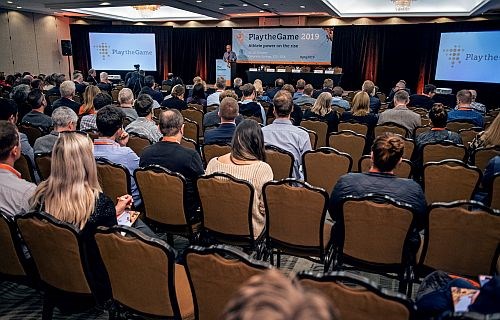Time’s up: Athlete power on the rise!

Photo: Thomas Søndergaard/Play the Game
With over 300 participants, Play the Game 2019 is set for three and a half days with inspiring debates on the most topical themes in the world of sport. The 11th edition of the world communication conference on sport and society puts the biggest challenges in global sport up for debate starting with the conference’s main theme: Athlete power on the rise!
Play the Game 2019 will also take on classic themes like doping, whistleblowing, match-fixing, corruption, but also one of the most discussed topics in the U.S., elite sport and college education, will be at centre stage during the conference.
Athlete rights on the agenda
This year’s conference takes place in a time where athletes are raising their voices like never before. Lately, we have seen how co-captain of the U.S. women’s national soccer team, Megan Rapinoe, used her voice to speak up for equal rights and diversity of identity. Athletes seem to take on a broad aspect of societal issues ranging from social injustice to demanding protection from a harmful sporting environment which not least since the brave female U.S. gymnasts revealed the unbearable sexual abuse from their national team doctor, Larry Nassar, has headlined the newspapers all around the world.
”Athlete engagement comes in various shapes and forms, but it is undeniable and hopefully irrevocable. It may have the potential to transform the world of sport,” Jens Sejer Andersen, International director at Play the Game, said in his opening speech.
“Athletes who speak up will face challenges, and they should. Athletes are not one and the same, there is more than one athlete voice. Athletes have different interests, sometimes conflicting interests, they have different views of the world and different opinions. […] But they do not deserve to be discredited by their own organisations who largely build their legitimacy on a perceived democracy embracing millions of individual athlete voters,” Andersen said.
Jens Sejer Andersen also had some news for the more than 300 delegates in his opening speech. With funding from EU, Play the Game will, in cooperation with three athlete organisations and four European universities, initiate a new project aiming to develop models for ‘Strengthening Athlete Power in Sport’.
“We have initiated this project because we favour athlete participation in decision-making, but also realise it is complex. It is a domain rich in dilemmas and questions that you will also find under scrutiny at this conference, for instance”
Local support
The host city of Play the Game 2019 has a prominent position in U.S. sport and is also an Olympic City USA. The city also hosts the main Olympic and Paralympic Training Center along with over 25 national sports federations plus the U.S. Anti-Doping Agency and United States Olympic Committee.
In his welcoming words, Carl Holst, Chairman of the Board, Play the Game / Danish Institute of Sports Studies, was expressing his appreciation to the strong commitment shown by the University of Colorado Colorado Springs making it possible for Play the Game to bring its conference abroad.
“As an institute we are very happy – for the first time – to be able to move our Play the Game conference outside Europe. More than 20 years ago the first Play the Game conference took place and on behalf of the board we are proud that throughout more than two decades our goal has remained the same: to promote democracy, transparency and freedom of expression in world sport,” Carl Holst said in front of the delegates.
Chancellor at the University of Colorado, Venkat Reddy, was glad to welcome all delegates to Play the Game 2019 and saw many similarities between his job as university Chancellor and Play the Game.
“Play the Game is aiming at raising the ethical standards of sport. Since I became Chancellor, I have been promoting a culture of respect, compassion, safety and excellence. […] In my mind, ethics is like oxygen. You can’t live without oxygen, but you can’t see it. [..] Ethics is no different. […] I deeply appreciate the work the Play the Game conference is doing, which is working to build a culture of ethics across teams and countries. […]”





